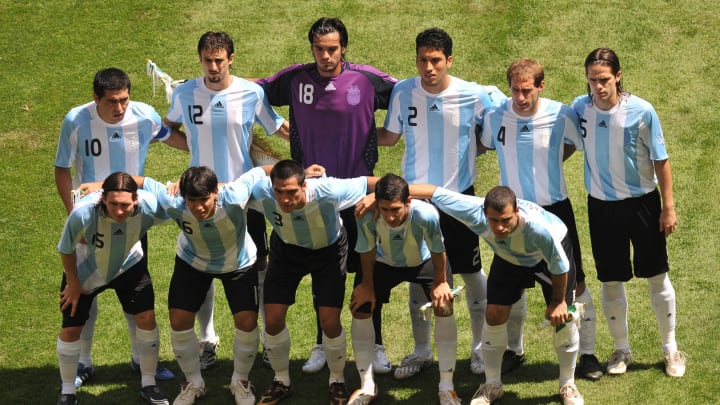Remembering the Star-Studded Argentina Team Who Romped to Olympic Gold in 2008

Cast your mind back to the 2014 World Cup final, when Lionel Messi left the Rio de Janeiro pitch in tears after the best Argentina team of the post-Maradona era had fallen short against Germany.
There was not a matchstick between Sergio Batista's Argentina and Joachim Low's immortal Germans, but a Mario Gotze extra-time finish did the damage. Germany left as legends, and Argentina exited with their wings seared, having flown so close to the fire.
It was heartbreaking for the likes of Messi, Sergio Aguero and Javier Mascherano not just because of how close they had come to getting their hands on the mythical, elusive trophy, but because this was the tournament that promised to bring about the crowning achievement for a group who had burst through the ranks together and taken international football by the scruff of the neck.
Sepp Blatter (former FIFA president): "At the 2014 World Cup final presentation ceremony, Messi was talking to himself. He said to himself over and over again: 'The best but not the champion.'" [la nacion] pic.twitter.com/1OAqX5Sx0R
— barcacentre (@barcacentre) June 15, 2019
There was a pack mentality in this Argentina team; this was a squad had been forged six years earlier, when it emerged victorious and invincible in a white-hot Beijing.
Of the 14 players who appeared in the final against Germany, seven had played their part under Sergio Batista in 2008. An Argentina team studded from head to toe with prodigious talent won every single game on their way to Olympic gold.
Nigeria were the victims in the final. They had hoped to repeat their famous 1996 victory, when they became the first African football team ever to conquer the Olympics, but it never quite looked like happening for them this time around.
?️ "Doing it together with friends like Leo is something I can’t put into words.”
— FIFA.com (@FIFAcom) August 23, 2020
?? #OnThisDay in 2008 some Messi magic & a Di Maria dink helped a star-studded @Argentina side win gold at the @Olympics ?
? https://t.co/Ex6jDr1cHVpic.twitter.com/4y6mOeEciB
Angel Di Maria's lovely chipped finish secured a 1-0 victory, but there was a chasm between the teams that the scoreline didn't reflect.
Football at the Olympics predates the FIFA World Cup by 30 years, making it the oldest tournament in the international sport. Between the World Cup's formation in 1930 and 1984, however, professional players were not permitted to take part; FIFA did not want the Olympic Games to rival their showpiece tournament.
Ahead of the 1984 Olympics in LA, these regulations were relaxed: professional players could now feature, but only three aged 24 or over, in order to keep some distinction between the two tournaments.
But while these restrictions hamstrung some international superpowers, with Spain and Germany's young teams failing to qualify, this bore no dilemma for Batista.
On this day in 2008, Argentina defeated Nigeria 1-0 to win Gold at the Olympics. Lionel Messi gave the assist as Angel Di Maria chipped the goalkeeper. Also on that team were Juan Riquelme, Javier Mascherano, Sergio Aguero, Sergio Romero, Pablo Zabaleta, Ezequiel Garay, more. pic.twitter.com/ulhYAjJmf4
— Roy Nemer (@RoyNemer) August 23, 2020
Having watched what would unfold over the next decade, the list of players of age makes for frightening reading; Messi (21), Aguero (20), Di Maria (20), Banega (20), Garay (21), Romero (21).
Throw in the marginally over-aged Javier Mascherano (24) and captain Juan Roman Riquelme (30), and it really is no surprise how the tournament panned out.
Coached by Batista, a former World Cup and Olympic-winning team-mate of Diego Maradona's, the spirit of Argentina teams of old was alive. With a blend of swashbuckling fluidity and savvy pragmatism, everyone went down: Ivory Coast, Australia, Serbia and the Netherlands were swept aside, before an Aguero double and a penalty from Riquelme secured a famous semi-final victory over neighbours Brazil.
Argentina Squad in Full
Goalkeepers: Oscar Ustari, Sergio Romero, Nicolas Navarro
Defenders: Ezequiel Garay, Fabian Monzon, Pablo Zabaleta, Federico Fazio, Nicolas Pareja
Midfielders: Fernando Gago, Jose Sosa, Ever Banega, Juan Riquelme, Javier Mascherano
Forwards: Angel Di Maria, Lionel Messi, Sergio Aguero, Ezequiel Lavezzi, Lautaro Acosta, Diego Buonanotte
What stands out about Argentina's run is that there was no leading goalscorer. While Italy's Giuseppe Rossi finished as the only player in the tournament to score four goals, no Argentina player scored more than two; Messi, Di Maria, Aguero and Ezequiel Lavezzi each netting twice.
The final was a disjointed affair. The decision to play the game at midday, when temperatures in Beijing peaked at more than 40° Celsius, meant two groups of players accustomed to searing climates struggled to maintain their usual tempo.
Both managers criticised the 12pm kick-off, as frequent water-breaks disrupted the game's rhythm. But Di Maria's cool, dinked finish was the moment of magic which secured a watershed victory for such a highly promising group.
#OnThisDay 9 years ago @Argentina won the 2008 Olympics' gold after beating Nigeria 1-0 in Beijing #VamosArgentina pic.twitter.com/UqCBROuDcr
— betoscope english (@betoscope_en) August 23, 2017
Described by The Guardian as "looking a little chubby but otherwise the picture of health", Maradona looked on beaming as the young players formed a celebratory circle in the middle of the pitch in China. But while things may not have culminated as he or his country would have liked six years later, the success stories among the group speak for themselves.
To this point, the squad named by Batista had attained 125 international caps between them, with Messi, Mascherano and Riquelme accounting for 105 of those. At the time of writing, ten of the 19 have gone on to pass the 50-cap mark at international level, and by this metric, it is the most prolific Olympic squad in history.
Messi or Aguero may not have come to much, with just the 1,114 club and international goals between them, but they can't all be winners.